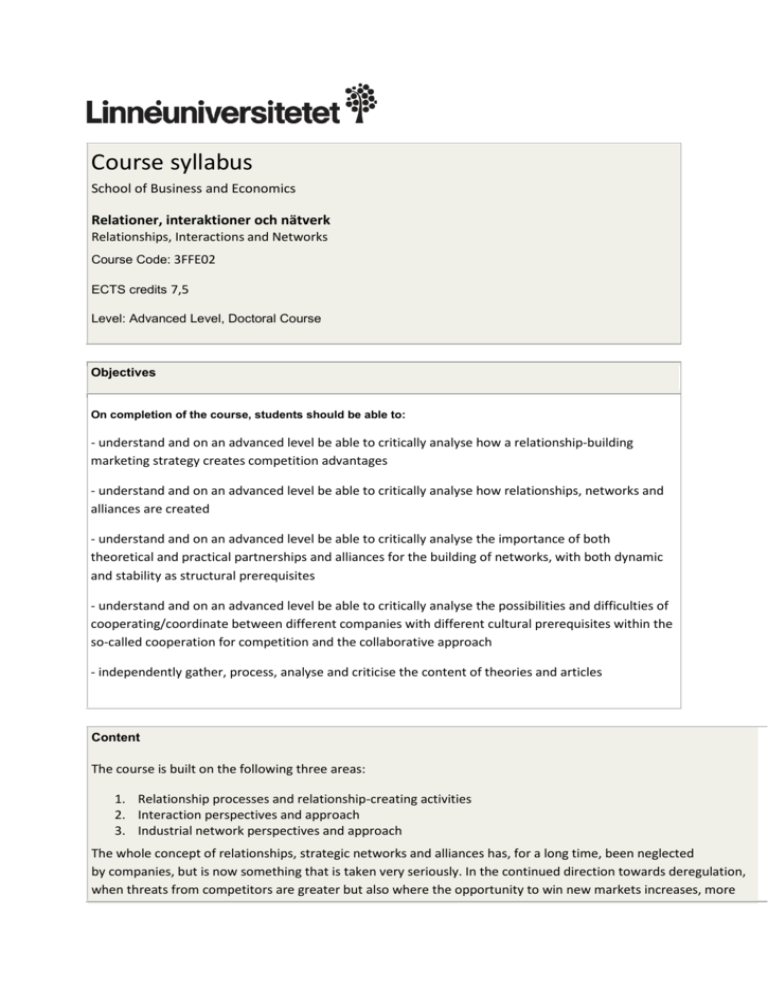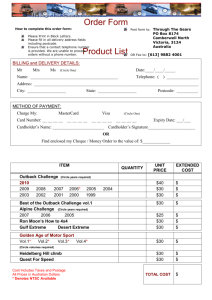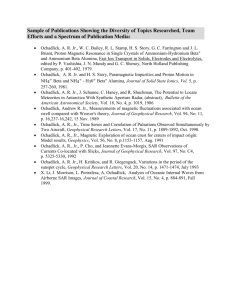Course syllabus
advertisement

Course syllabus School of Business and Economics Relationer, interaktioner och nätverk Relationships, Interactions and Networks Course Code: 3FFE02 ECTS credits 7,5 Level: Advanced Level, Doctoral Course Objectives On completion of the course, students should be able to: - understand and on an advanced level be able to critically analyse how a relationship-building marketing strategy creates competition advantages - understand and on an advanced level be able to critically analyse how relationships, networks and alliances are created - understand and on an advanced level be able to critically analyse the importance of both theoretical and practical partnerships and alliances for the building of networks, with both dynamic and stability as structural prerequisites - understand and on an advanced level be able to critically analyse the possibilities and difficulties of cooperating/coordinate between different companies with different cultural prerequisites within the so-called cooperation for competition and the collaborative approach - independently gather, process, analyse and criticise the content of theories and articles Content The course is built on the following three areas: 1. Relationship processes and relationship-creating activities 2. Interaction perspectives and approach 3. Industrial network perspectives and approach The whole concept of relationships, strategic networks and alliances has, for a long time, been neglected by companies, but is now something that is taken very seriously. In the continued direction towards deregulation, when threats from competitors are greater but also where the opportunity to win new markets increases, more and more time has been dedicated to a so-called Total Relationship Management (TRM) approach. TRM can be translated by creating, interpreting, maintaining and increasing positive, long-lasting close relationships and interactions between companies and their internal and external customers/partners. The collaborative approach proposes a partnership with a win-win relationship. The collaborative approach includes networks, coordination, integration, links and interaction between different actors. Forms of Teaching and Language Seminars, lectures and assignments in Swedish and/or English. Forms of Examination Examinations are carried out in the form of written papers. The oral and written presentation of students’ own work is included as a part of the examination. What is more, written and oral opposition of other students’ work will be included in the assessment. For a grade of Pass on the entire course, students must receive a grade of Pass on at least 4 of 5 possible papers. The course is assessed with the grades Fail or Pass in accordance with the ECTS grading scale. Entry Requirements Acceptance to third-cycle studies at Social Sciences/Humanities Faculty or general entry requirements for third-cycle studies. Course Literature and other Teaching Aids Books Håkansson, H., Snehota, I., (1995) Developing Relationships in Business Networks, Routledge, Download: http://www.impgroup.org/uploads/books/0-415-11570-1.pdf Jansson, H. (2007) International Business Marketing in Emerging Country Markets. The Third Wave of Internationalization of Firms", Edward Elgar. 238 pages Jarvis, J. .What would Google do? (2009), HarperLuxe, NY, 433 pages Zineldin, M. et al (2012), Relationship management for the future, Studentlitteratur, 350 pages Articles Relationships and Interactions Barringer, R., B., Harrison S., J. (2000), Creating value through interorganizational relationships, Journal of Management, vol. 23, 367-403 Johanson, J. and J.-E. Vahlne, (2009), ”The Uppsala Internationalization Process Model Revisited: From Liability of Foreignness to Liability of Outsidership”, Journal of International Business Studies, Vol. 40, No. 9. Mattyssens, P and Van den Bullte, C. (1994),Getting Closer and Nicer: Partnerships in the Supply Chain, Long Range Planning, vol 27, no 1, 72-83 Ross Jr., W. T., Robertson, D. C. (2007), Compound Relationships Between Firms, Journal of Marketing, vol. 71, 108-123 Stafford, E. And Hartman, G. (1997), Green Allinaces: Building New Business With Environmental Groups, Long Range Planning, vol 30, no.2, 184-196 Zineldin, M. 2004. Co-opetition: the organisation of the future, Marketing Intelligence & Planning 22(7): 780-790. Zineldin, M. (2002) "Developing and managing a romantic business relationship: life cycle and strategies", Managerial Auditing Journal, Vol. 17 Iss: 9, pp.546 – 558 Zineldin, M. Abraha, D. & Vasicheva, V. (2008). Establishment Processes and Building Relationships In Latin American Countries – The Case of Swedish Firms in Mexico, International Journal of Automotive Industry and Management (IJIAM), Vol. 2, Number 1, pp. 23-47 Networks and Relationships Davern, M. (1997), Social networks and economic sociology, American Journal of Economics and Sociology, vol. 6, no 3 Ehret, M., (2004) Managing the trade-off between relationships and value networks. Towards a value-based approach of customer relationship management in business-to-business markets, Industrial Marketing Management, vol. 33, 465-473 Ford, D., Håkansson, H., et al. Managing Networks, Download http://www.impgroup.org/uploads/papers/4198.pdf Foss, N. (1999),Networks, Capabilities, and Competitive Advantage, Scandinavian Journal of Management, 15, 1-15 Håkansson, H. and Snehota, I. (1989)No Business is an Island: The network Concept of Business Strategy, Scand. J. Mgmt. Vol. 5, no 3. 187-200 Zineldin, M. (1998), Towards an Ecological Collaborative Relationship Management: A ”Co-Opetive” Perspective, European Journal of Maketing, vol. 32, no 11/12, 1138-1164 Zineldin, M. and Dodourova, M. (2005) "Motivation, achievements and failure of strategic alliances: The case of Swedish auto-manufacturers in Russia", European Business Review, Vol. 17 Iss: 5, pp.460 – 470 Trust and Commitment Cannon, J. And Doney, P. (1997), An Examination of the Nature of trust in Buyer-Seller relationships, Journal of Marketing, Vol 61 (April), 35-51 Cote, J. and Latham K C. (2006), Trust and Commitment: Intangible Drivers of Interorganizational Performance, in Marc J. Epstein, John Y. Lee (ed.) 15 (Advances in Management Accounting, Volume 15, 293-325 Friman, M. et al., (2000) An analysis of international business to business relationships based on the Commitment-Trust theory, Industrial Marketing Management (2002), vol. 31, 403-409 Hunt, S. & Morgan. R. (1994)The Commitment-trust Theory of Relationship Marketing, Journal of Marketing, Vol. 58 (July), 20-28 Wong, A. and Sohal, A. (2002) ‘An examination of the relationship between trust, commitment and relationship quality’, International Journal of Retail & Distribution Management, Vol. 30, No. 1, pp.34–50. Zineldin, M. and Jonsson,P. (2000) "An examination of the main factors affecting trust/commitment In supplier-dealer relationships: an empirical study of the Swedish wood industry", The TQM Magazine, Vol. 12 Iss: 4, pp.245 – 266 Course Evaluation The course is evaluated continuously throughout the course through discussions with the participants with the aim of maintaining continued quality development..





